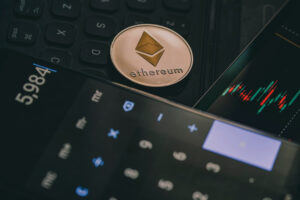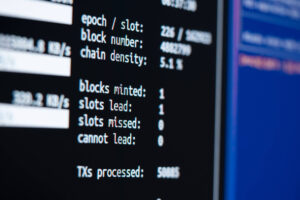An Automated Market Maker (AMM) is a system that provides liquidity to an exchange through automated trading, enabling decentralized exchange platforms on the blockchain (DEXes).
Currently, the vast majority of cryptocurrency exchanges are centralized, meaning they are operated by a company and conduct trading and custody on a closed server system. As centralized exchanges carry risks associated with centralized custody of crypto assets, the idea of decentralized exchanges is fundamentally appealing. In decentralized exchanges, crypto assets are held directly by the investor in their own wallet and are only transferred when a trade with another market participant occurs. Thus, the investor retains ownership of their assets.
Decentralized trading alternatives on the blockchain: AMMs
Decentralized trading alternatives on the blockchain, such as Automated Market Makers (AMMs), are the most widely used DeFi applications by trading volume. Unlike centralized exchanges (CEXs), DEXes do not have order books that determine the price of a token. Instead, liquidity pools can be created for all ERC-20 tokens, with anyone able to provide liquidity to them. When a user wants to buy a specific token or swap it for another, such as Ether (ETH), they access the relevant liquidity pool.
The price is automatically adjusted by the Automated Market Maker (AMM) protocol, without the need for a third party, based on the token reserves in the liquidity pools. As an incentive, liquidity providers (LPs) receive all the fees. To decentralize decision-making processes, most DEXs have governance tokens, allowing users to decide, for example, which liquidity pools should receive additional incentives.
History of Automated Market Makers
The history of Automated Market Makers (AMMs) is closely tied to the development of decentralized finance (DeFi) and the broader blockchain ecosystem. The concept traces back to early experiments with decentralized exchanges but gained prominence with the introduction of the Ethereum blockchain in 2015. The breakthrough came with the introduction of Ethereum-based decentralized trading platforms like EtherDelta in 2017. Subsequent platforms utilized smart contracts to automate the trading process, enabling users to trade directly from their wallets without creating accounts or depositing funds on centralized exchanges.
The real turning point for AMMs came in 2020 with the emergence of Uniswap, which introduced a novel automated pricing mechanism based on liquidity pools. Uniswap's success led to an explosion of DeFi projects and the provision of liquidity on Ethereum. Subsequent iterations of Automated Market Makers, such as Uniswap V3, further refined the concept. Today, AMMs are a foundational component of the DeFi ecosystem.









